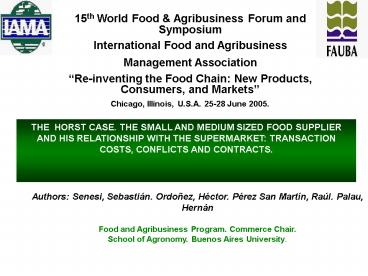Presentacin de PowerPoint - PowerPoint PPT Presentation
1 / 12
Title:
Presentacin de PowerPoint
Description:
Argentina since 1992 Changes in marketing practices and marketing channel ... Argentina (Disco, Norte, Jumbo, La An nima, Coto, Carrefour, Wall Mart, etc. ... – PowerPoint PPT presentation
Number of Views:42
Avg rating:3.0/5.0
Title: Presentacin de PowerPoint
1
15th World Food Agribusiness Forum and
Symposium International Food and Agribusiness
Management Association Re-inventing the Food
Chain New Products, Consumers, and
Markets Chicago, Illinois, U.S.A. 25-28 June
2005.
THE HORST CASE. THE SMALL AND MEDIUM SIZED FOOD
SUPPLIER AND HIS RELATIONSHIP WITH THE
SUPERMARKET TRANSACTION COSTS, CONFLICTS AND
CONTRACTS.
Authors Senesi, Sebastián. Ordoñez, Héctor.
Pérez San Martín, Raúl. Palau, Hernán Food and
Agribusiness Program. Commerce Chair. School of
Agronomy. Buenos Aires University.
2
1)Problem Statement
- Argentina since 1992 Changes in marketing
practices and marketing channel - Last 10 years shifts in Argentine economy, small
and medium size producers disadvantage in their
bilateral relationship with supermarkets. - Conflicts and high transaction costs emerge
partly from the incompleteness of contracts and
partly from the power imbalances - The key goal is identifying and describing the
different relationships between the supermarket
and Horst, as well as the origin and the
different kinds of conflicts.
3
2) Methodology and T. Framework
- METHODOLOGY
- Case Study Analysis.
- Interviews.
- T. FRAMEWORK
- New Institutional Economics Transaction Costs
Economics (Williamson, Zylbersztajn, others). - Comparative Discrete Structural Analysis (North,
Williamson) - Coasian Agribusiness Systems (Zylbersztajn
Farina PENSA). - Distribution Channel/Channel Markets (Coughlan)
4
3) The Fresh Mushroom Industry in Argentina
- Until 1993, local mushrooms were cultivated,
without the appropriate technology or trained
personnel. - The market inexistent, consumers did not know
the product. - Product seasonally produced, high price,
heterogeneous quality - .The institutional shifts in the 90s also
allowed opening up the economy. - At present, 85 product. Five companies, Horst,
Abrantes, Champignones Argentinos, Chung, and
Micel - Consumer and Producer behaviour before and after
2002. - Such decline in supply (approximately 40)
results from a fly from quality
5
4) The Horst Case
- Horst S.A.. A family company. Argentine capitals,
it started doing business in 1994, in a modern
plant for industrial production of fresh
mushrooms at Los Cardales, Province of Buenos
Aires, 55 km away from the Federal District. - Horst keeps a differentiation policy based on
quality and higher than average prices. - Products Agaricus bisporus and Portobello sp.
- 400 Ton year production capacity (market share
40). - Brands 85 Le Chapeau, Bells and Fungi
- Distributed daily to 70 points of sale in the
Federal District, Greater Buenos Aires, inland
Argentina (Disco, Norte, Jumbo, La Anónima, Coto,
Carrefour, Wall Mart, etc.) - Competitors, Abrantes and Champignones Argentinos
in the same marketing channel, lower price
product, mostly in bulk and lower quality.
6
5) Horst an the Market
- Whereas a classic market contract suffices for
low specific asset transactions, a market
governance structure poses risks when specific
assets are involved in the transactions
(according to Williamson, 1996). - Keep cold chain, collection certainty, longer
payment terms, product gets positioned in new
markets through the typical supermarket
logistics. - Concentration tendency exhibited by supermarket
chains is a threat in particular for a small
company like Horst, - There is an income transfer from the industry to
the distribution sector, which worsens as the
period to get paid becomes longer. - No compensation to the industry)
7
5) Horst an the Market
- Crisis of 2001 incompleteness of contracts
encroachment on property rights, to disloyal
practices and opportunistic actions. - Unforeseen discounts, unauthorized returns,
overdue payments for which no penalty interest
pay, and forced sharing of advertising - In the industry, Tax evasion , Non-compliance
with sanitary standards, opportunistic behavior
8
6) Horst and Contracts. Disco and Norte Cases
- Contracts with Disco and Norte are generally
incomplete - 1) short-term 2) the price is listed but
quantities are determined based on daily orders
3) Quality is implicit and there is no specific
protection involved. - Long-term contract which specifies the terms and
conditions ex-ante is the right way to prevent
problems,
9
6) Horst and Contracts. Disco
- Horsts goal protect their investment on
specific assets thus, it obtains a quasi-rents. - Higher purchasing power of Disco clients.
- According to quality perception by Disco clients,
exchanging scarce resources creates dependence. - Transactions are correctly aligned with
technology provision, with the price the product
is marketed for (the highest of the market), and
with governance structures. - It should be noted that over the 98/01 period,
the company lost to Disco 17 of its profits,
representing 0,35US/Kg of what was sold to the
latter.
10
6) Horst and Contracts. Norte
- Norte aims at two different segments of demand
- Abrantes and Champignones Argentinos are
their main mushroom suppliers, Horst supplies
trays. - Horst uses the same technology they use for
markets. - This is indifferent for Norte because it has
lower quality requirements no need to take such
an investment so much into account. - Prices vary if the sale is bulk (most sales) or
tray. Norte prices for trays is lower than
Discos and there is no option to return the
product (hedging). - The governance structure does not have a clear
identity bilateral conflict resolution
mechanisms, typical of hybrid forms, are present.
- Even though Horsts sale price is lower,
transaction costs ex post have been remarkably
reduced.
11
7) Discussion and Conclusion
- Table 1 Incidence of taxes, financial cost and
quasi-rent on profitability
Contract redesign to minimize conflict
Procedural Manuals, Type and Quality Systems per
supermarket, Information Systems, Returned
Products. Using a strategy of collaboration
between the parties.
12
THANK YOU































